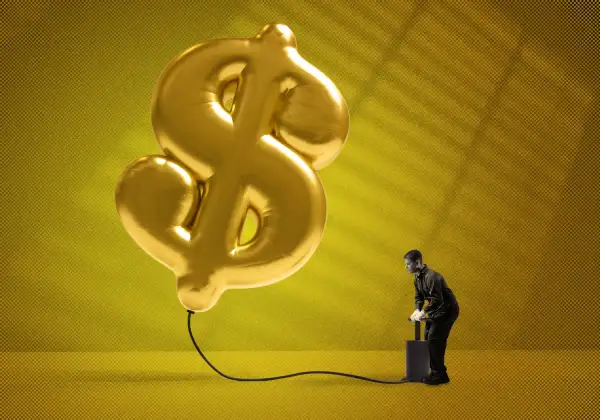Will There Be a Recession in 2024? Here's What Economists Predict

For many Americans, 2023 was a hard year financially, but will what's coming be better or worse? Some experts say to brace for a recession in 2024 — while others say not to sweat it.
In early 2023, with high inflation and rising mortgage rates, there was all but a consensus that the United States would experience a recession by the end of the year. But the the National Bureau of Economic Research's Business Cycle Dating Committee, which officially dates recessions in the U.S., never declared one.
The economy has been strengthening instead; gross domestic product rose by 2.1% in the second quarter and an estimated 4.9% in the third. Unemployment data has come in favorable, too: The unemployment rate was below 4% in October, and the U.S. added 150,000 jobs that month.
This has done a lot to assuage worries of a 2023 recession. Now, all eyes are on the new year.
In some respects, pessimism lingers. Concerns are focused mostly on the Federal Reserve's interest rate hikes. It paused increases in September but has remained unclear whether it will raise rates again before year's end. These high interest rates and their trickle-down effects, some have argued, are putting enough pressure on businesses and consumers to drive the economy into a recession in 2024.
While experts continue to butt heads on the chances of a recession next year, here's what some are saying.
No, we're not heading for a 2024 recession
Aneka Beneby, portfolio manager and director at Julius Baer Group
"I see no imminent recession in the U.S.," Beneby told Bloomberg, adding that October's consumer price index data, which showed a year-over-year easing of inflation to 3.2% from 7.7% in October 2022, "confirms the disinflationary trend." Beneby predicted that the Fed will halt its rate hikes and that the economy will moderate, dampening the likelihood of more inflation and creating favorable market conditions.
Brian Moynihan, CEO of Bank of America
"Our research team is the best in the business, and they have moved to the soft landing category," Moynihan said last week at a Reuters conference, referring to the Fed's plan to rise interest rates high enough to curb inflation but low enough to avoid a recession. He added that Bank of America analysts foresee both one more rate hike in December and "a slowdown in the economy in the middle of next year."
James Lord, global head of currency at Morgan Stanley
In Morgan Stanley's "Thoughts on the Market" podcast this week, Lord said he expects the U.S. economy to "outperform consensus expectations and remain near potential growth rates in the first half of 2024." He went on to contrast U.S. outlook with the "recessionary conditions" in Europe, and while he acknowledged the possibility of "deep easing" as the Fed cuts rates later next year, he did not forecast a recession in the States.
Yes, we're heading toward a 2024 recession
Charlie Dougherty, senior economist at Wells Fargo
Dougherty predicted at a finance conference this week that while the worst of inflation is behind us, a recession still looms for the second half of 2024. "Going from 9% to 4%, that was always going to be easy," Dougherty said, predicting that the Fed's rate cuts will trigger a mild recession. He added that this is a "normal part of the economy" and necessary for the central bank to reach its target inflation rate of 2% in the long run.
Thomas Hoenig, former president of the Kansas City Federal Reserve Bank
"I think there is still a good risk of a recession, and so does the Fed," Hoenig told FOX Business this week. "Rates are still high enough, and the economy is still fragile enough, that the risk of a recession remains." Hoenig predicted that this fragility could accelerate the rate of the Fed's cuts to combat this recession likelihood, with the idea being that lower interest rates can trigger more spending — and ultimately a healthier economy.
TD Securities
Financial service company TD Securities wrote in its latest forecast that it expects a "mild" recession for the U.S. in 2024. "We put the odds of a U.S. recession at around 65%," it wrote, citing interest rate effects, risk of government shutdown and a weaker labor market as the causes. The company said it expected unemployment to rise from its current rate of 3.9% to 4.6% by the end of 2024.
More from Money:
How Much House Can You Afford? Many Buyers Are Ignoring a Classic Rule of Thumb
2024 Tax Brackets: IRS Increases Income Thresholds, Standard Deduction Due to Inflation
Tracking Your Tax Refund Will Be 'Significantly' Easier Next Year: IRS
